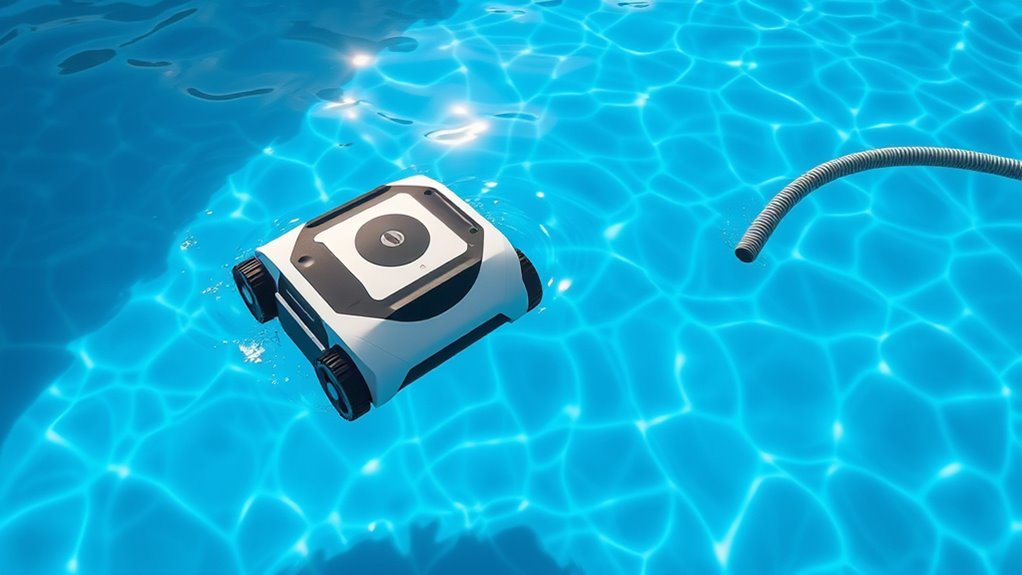Pressure pool cleaners use water flow from your pool’s filtration system to move and pick up debris, while robotic cleaners operate independently with their own power and smart navigation. Robotic models offer more thorough cleaning with less maintenance, but they come at a higher initial cost. Pressure cleaners are more affordable upfront but may require more manual effort. To find out which type suits your needs best, explore the detailed differences below.
Key Takeaways
- Pressure cleaners use pool water pressure for movement, while robotic cleaners operate independently with their own power source.
- Robotic cleaners provide more thorough, systematic cleaning with advanced navigation, unlike pressure models which may miss certain areas.
- Pressure cleaners are generally more affordable upfront but require manual guidance and more maintenance.
- Robotic cleaners have higher initial costs but offer lower ongoing maintenance and energy efficiency.
- The choice depends on pool size, debris level, maintenance preferences, and budget considerations.
How Pressure Pool Cleaners Operate
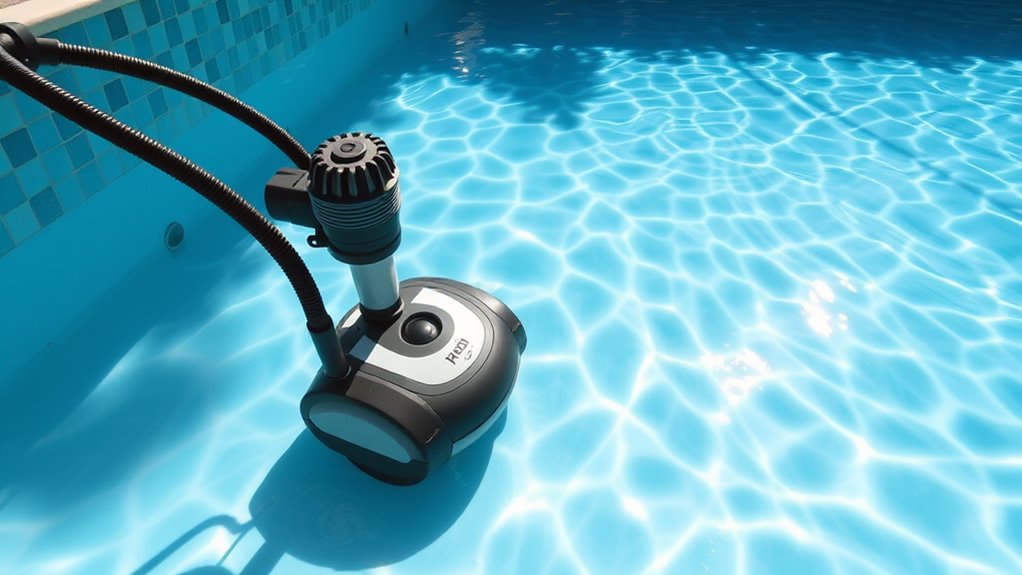
Pressure pool cleaners work by using water pressure from your pool’s existing filtration system to power their movement and cleaning functions. As water flows through the cleaner, it creates the force needed to propel the device around the pool. This flow directs the cleaner’s movement, allowing it to cover the pool floor and walls efficiently. During operation, the cleaner uses the water pressure to generate suction, which helps lift debris from the pool surfaces. The debris removal process is quick and effective, with the cleaner trapping dirt, leaves, and other particles in its filter bag. Because it relies on water flow, it doesn’t require batteries or electrical cords, making it a straightforward and dependable option for keeping your pool tidy.
How Robotic Pool Cleaners Function
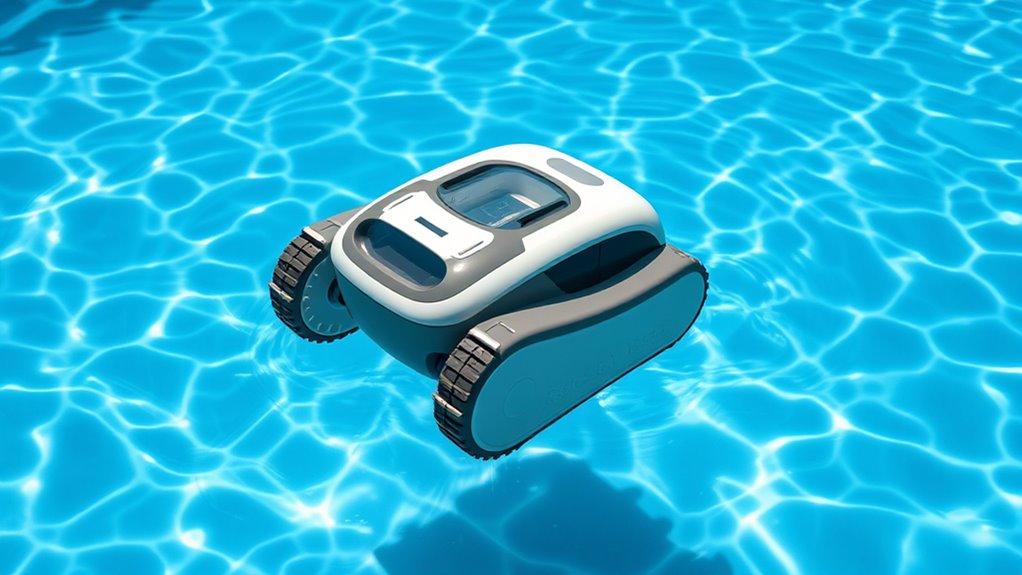
Robotic pool cleaners operate independently of your pool’s filtration system by using their own electrical power sources and advanced navigation technology. They navigate your pool efficiently, covering surfaces systematically for peak cleaning. This design enhances cleaning efficiency, ensuring debris, algae, and dirt are removed thoroughly. Maintenance requirements are minimal; you mostly need to clean the filter and check for obstructions. The smart navigation systems allow the cleaner to adapt to pool shapes and obstacles. Regularly updating firmware can improve their navigation algorithms and overall performance. Additionally, many models feature remote control capabilities, allowing you to start or stop cleaning sessions remotely for added convenience. These features collectively contribute to a more efficient cleaning process, saving time and effort. Incorporating AI-driven diagnostics can further optimize maintenance schedules and device longevity.
Advantages and Disadvantages of Pressure Cleaners
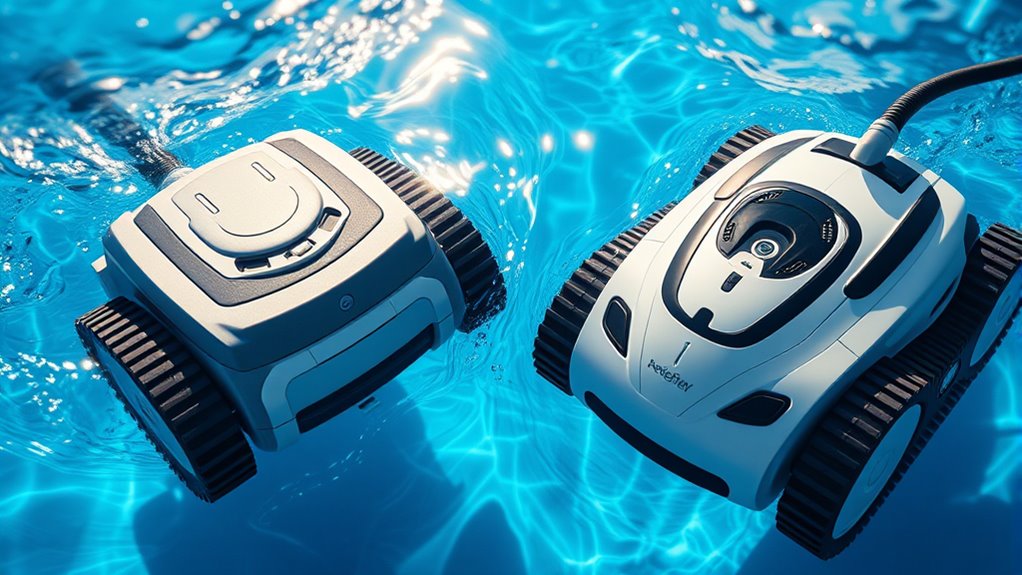
While robotic pool cleaners offer many advantages, pressure cleaners present a different set of benefits and challenges worth considering. One key advantage is their ability to improve pool safety by effectively removing debris that could cause slips or accidents. They’re generally energy-efficient because they rely on existing pool equipment, meaning you might spend less on electricity compared to fully automated robots. Additionally, digital literacy programs encourage playful communication among seniors, highlighting how simple technology can foster social connection. However, pressure cleaners can be less thorough in cleaning certain areas and may require more manual guidance, which can be a disadvantage if you prefer a hands-off approach. Additionally, they tend to be bulkier and may have more parts that need maintenance. Furthermore, the type of debris can influence the effectiveness of pressure cleaners, as larger or more stubborn debris may require different cleaning approaches. Proper maintenance of pool equipment can also impact the overall cleaning performance. Overall, pressure cleaners can be a cost-effective, safe option, but they might not deliver the same level of convenience and cleaning precision as robotic alternatives.
Advantages and Disadvantages of Robotic Cleaners
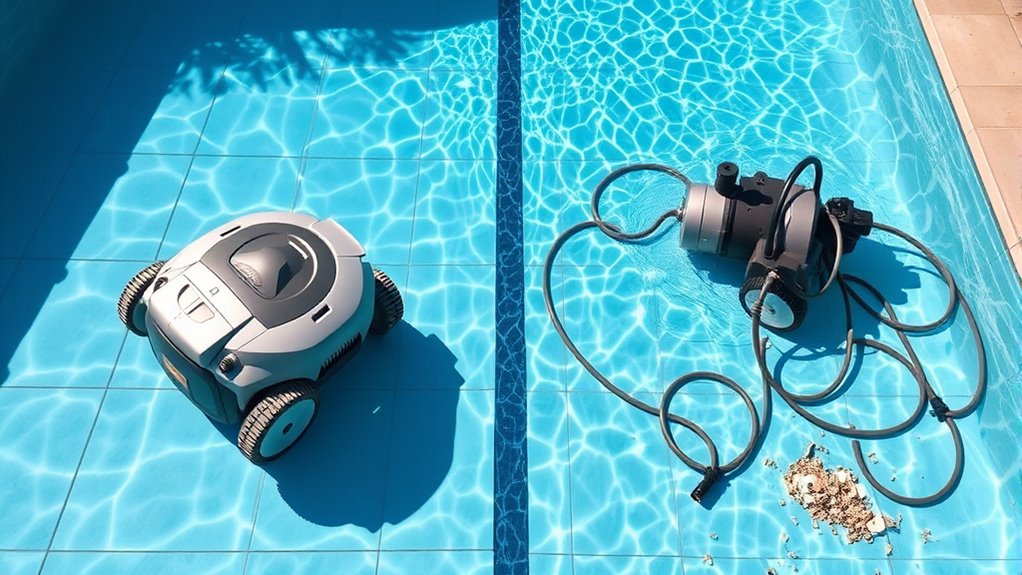
Robotic pool cleaners are designed to independently navigate and scrub your pool’s surfaces, offering a high level of convenience and consistent cleaning performance. They reduce manual effort and typically require less maintenance. However, their higher initial cost can be a drawback, and maintenance costs may add up over time. Energy efficiency is a significant advantage, as robotic cleaners usually consume less power than pressure or suction models. They also tend to clean more thoroughly, reaching corners and steps effectively. Here’s a quick comparison:
| Aspect | Pros | Cons |
|---|---|---|
| Maintenance costs | Low, since they require minimal upkeep | Can be expensive to repair or replace parts |
| Energy efficiency | High, consumes less power | Higher upfront purchase price |
| Cleaning coverage | Thorough, covers all pool surfaces | Limited runtime depending on battery |
Additionally, advancements in navigation technology have improved their ability to map and adapt to different pool shapes for more efficient cleaning. This progress helps ensure comprehensive cleaning with less user intervention. Furthermore, newer models often incorporate smart features that enable better control and scheduling, enhancing overall performance. The integration of remote monitoring has also made it easier for users to oversee cleaning sessions and troubleshoot issues remotely.
Choosing the Right Pool Cleaner for Your Needs
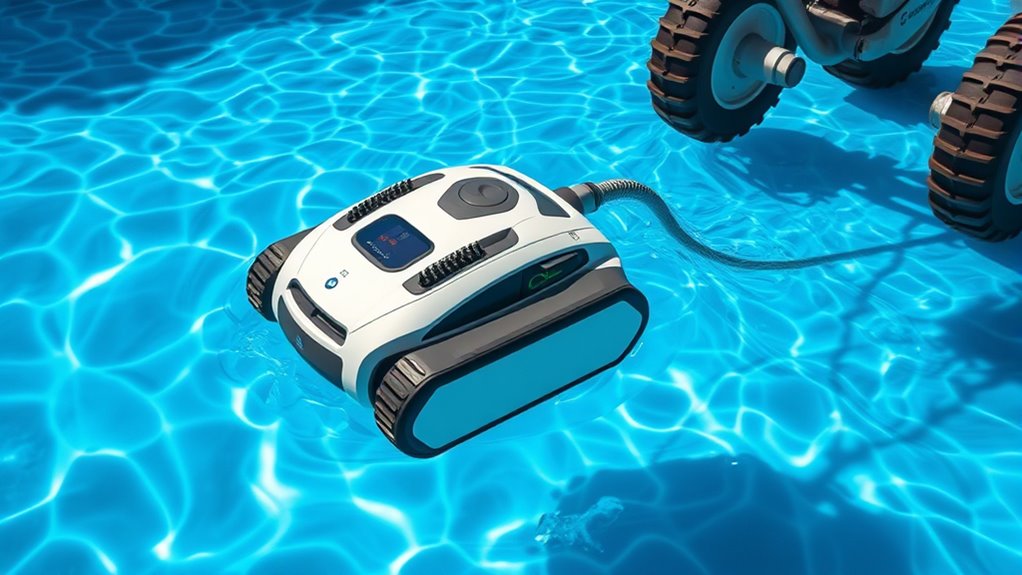
Choosing the right pool cleaner depends on your specific needs, pool size, and budget. If energy efficiency is a priority, robotic cleaners often consume less power and operate quietly, saving you money over time. Consider maintenance requirements too; robotic cleaners generally need minimal upkeep, with some needing filter replacements or occasional cleaning. Additionally, pressure pool cleaners tend to be more affordable upfront but may use more energy and require more frequent maintenance. Think about how often you’ll use your cleaner and the level of debris your pool collects. A larger, heavily used pool might benefit from a more durable, energy-efficient robotic model, while smaller pools with lighter debris could do well with a simpler pressure cleaner. Moreover, cleaning efficiency can vary significantly between models, so reviewing customer feedback and product specifications can help you make an informed choice. When selecting a pool cleaner, it’s also helpful to consider website performance metrics to ensure you are getting accurate and detailed product information. Evaluating filter replacement frequency and overall maintenance requirements will help in choosing a reliable model that fits your lifestyle and pool conditions. Additionally, understanding Kia Tuning options can provide insights into customizing your vehicle for better performance and aesthetic appeal, which can be useful if you own a Kia and want to optimize your vehicle alongside your pool maintenance routines. Proper research and understanding of environmental considerations can also help you select a cleaner that aligns with your eco-friendly values.
Frequently Asked Questions
Which Type of Cleaner Is More Energy-Efficient?
When considering which cleaner is more energy-efficient, you should look at energy consumption and operational costs. Typically, robotic pool cleaners use less energy because they operate independently and require minimal water pressure. They often have programmable features that optimize their cleaning cycles, reducing overall power use. In contrast, pressure cleaners tend to consume more energy due to their reliance on higher water pressure and continuous operation, leading to higher operational costs over time.
How Do Maintenance Costs Compare Between Pressure and Robotic Cleaners?
Think of maintenance costs as the health of your pool’s guardian. When comparing pressure and robotic cleaners, robotic models often have higher initial repair expenses but fewer ongoing repairs, making their long-term costs more predictable. Pressure cleaners may seem cheaper upfront, but repair expenses can add up over time. You’ll want to weigh the cost comparison carefully, considering both immediate repair needs and future expenses, to choose the best fit for your pool.
Can Pressure and Robotic Cleaners Be Used Together?
You can definitely use pressure and robotic cleaners together for dual cleaning, which maximizes your pool’s cleanliness. Hybrid systems combine both types, allowing you to enjoy the benefits of each. This approach can make maintenance easier, reduce overall costs, and guarantee a detailed clean. By integrating both cleaners, you get a more efficient, all-encompassing pool cleaning system that keeps your water sparkling and reduces manual effort.
Are Robotic Cleaners Suitable for Large or Complex Pools?
Robotic cleaners are suitable for large or complex pools, especially if you have a busy schedule. They handle various pool sizes and cleaning complexities efficiently, reaching difficult areas with ease. However, for very large pools or intricate designs, you might need to contemplate a more powerful or specialized robotic model. Overall, robotic cleaners can markedly simplify maintenance, saving you time and effort regardless of your pool’s size or complexity.
How Long Do Each Type Typically Last Before Needing Replacement?
You want to know how long each cleaner typically lasts before needing replacement. Robotic pool cleaners usually have a lifetime expectation of around 5 to 7 years, with replacement needed every few years depending on usage and maintenance. Pressure cleaners tend to last about 3 to 5 years, but their replacement frequency can be higher if parts wear out or break. Proper care extends their longevity, so regular maintenance is key.
Conclusion
Choosing between pressure and robotic pool cleaners depends on your pool’s size, shape, and your maintenance preferences. For example, a homeowner with a small, easy-to-access pool might find a robotic cleaner more efficient, saving time and effort. Conversely, if you have a larger pool with complex features, a pressure cleaner could do the job more cost-effectively. Assess your needs carefully, and you’ll find the best cleaner to keep your pool sparkling effortlessly.
